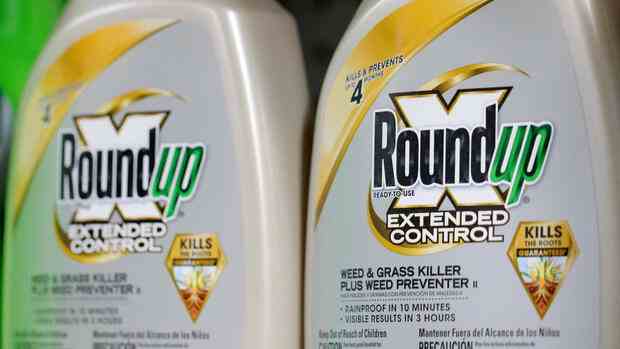There is still no quick solution in sight for Bayer in the compensation lawsuits in the USA.
(Photo: Reuters)
Dusseldorf It is still one of the biggest stress factors for Bayer shares: the Leverkusen-based group is still not completely getting rid of the billion-euro legal risks related to the weed killer glyphosate. Now another possible way to finally stop the lawsuits in the USA is blocked.
It is about the use of the special “Chapter 11” according to US bankruptcy law. Bayer itself never brought this option into play. The activist investor Jeffrey Ubben, who joined Bayer in mid-January, had suggested to the management that they finally escape the threat of lawsuits via this legal loophole.
However, a US court put a stop to this possibility on Monday evening in proceedings against the pharmaceutical company Johnson & Johnson (J&J). It’s about the so-called “Texas Two-Step”, a legal trick that US corporations have recently tried to evade claims for damages from plaintiffs worth billions.
40,000 lawsuits against Johnson & Johnson
J&J is facing a spate of lawsuits from women who used one of the company’s previous baby powders and have developed ovarian cancer. The company has denied a connection but lost several lawsuits in a row. The lawsuit brought by a group of women in court ended spectacularly, and the jury awarded damages of two billion dollars.
Around 40,000 such lawsuits are pending against J&J. The pharmaceutical company sees its reputation and assets at risk. In order to evade the further risk of litigation as quickly as possible, J&J chose the “Texas Two-Step”: The group founded a new company in the US state and then split it into two companies.
The entire legal burden from the baby powder proceedings was transferred to one of the companies and this company was then declared bankrupt. In the subsequent “Chapter 11” proceedings, the company would still have settled claims by plaintiffs in settlements. However, she would have been protected from further processes.
In Texas, this is basically possible because of the special company law there. But an appeals court in Philadelphia has now ruled that J&J cannot use this loophole for its own purposes. The group is now heading towards a billion-euro settlement with the plaintiffs – and it is also not getting rid of further legal risks.
Bayer relies on “lure and deter” in glyphosate lawsuits
It is therefore clear that the bankruptcy trick is not an option for Bayer to get rid of the glyphosate lawsuits. The group has already entered into a settlement with payments of more than ten billion euros to existing plaintiffs. This happens without an admission of guilt, because Bayer rejects the suspicion that glyphosate has carcinogenic effects.
Another program regulates the handling of future lawsuits. Bayer relies on “lure and deter”. Settlement payments are to be negotiated directly with eligible plaintiffs without going to court. Recently, the group has won several procedures in a row and has thus gained advantages.
The program is intended to curb the financial and, from Bayer’s point of view, damaging effects of the glyphosate lawsuits as far as possible. A quick end to this legal burden will not bring it.
More: Hedge funds put Bayer under pressure – German investors are also demanding a new CEO from outside
